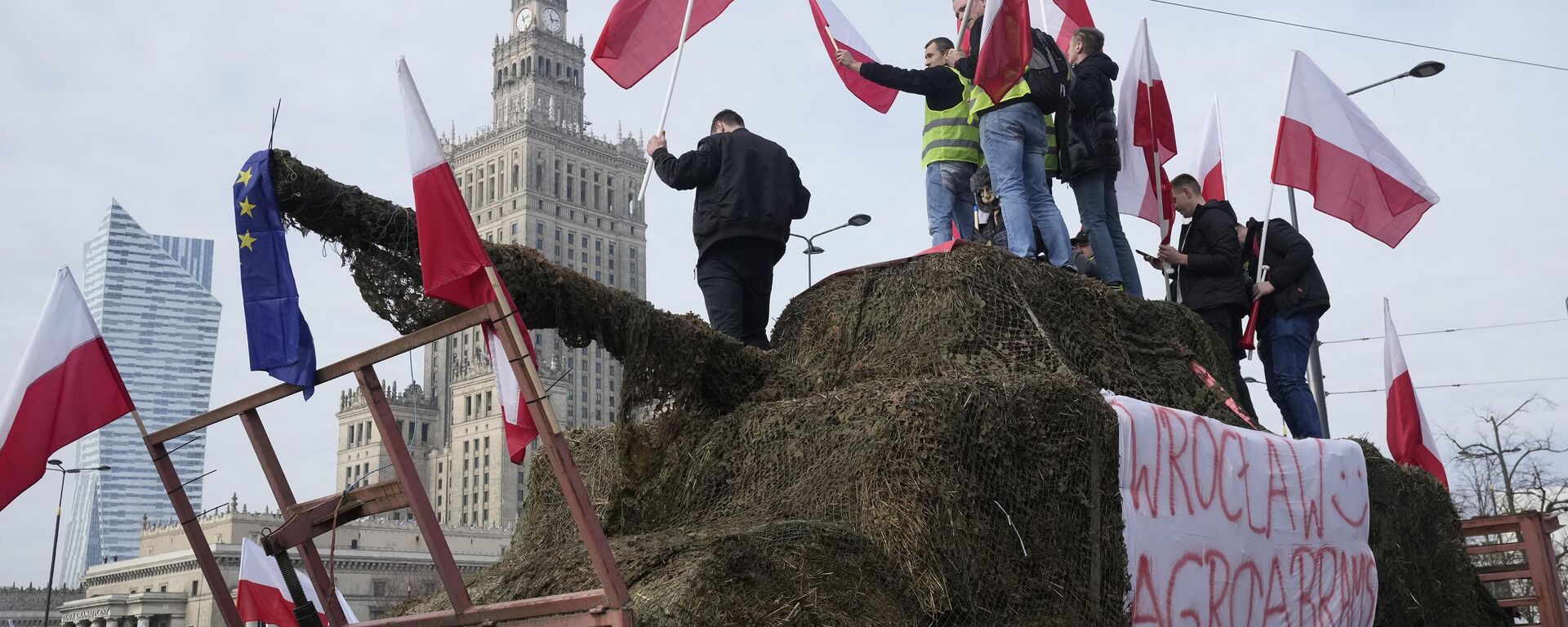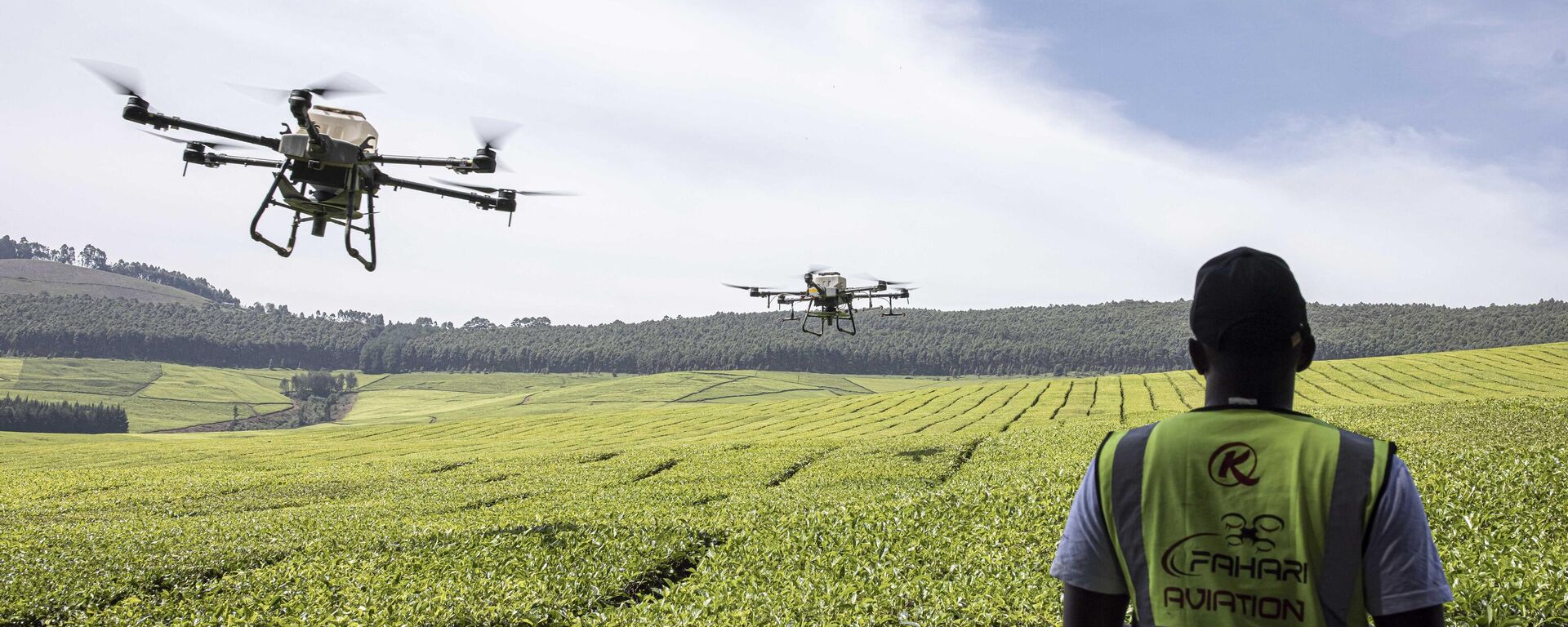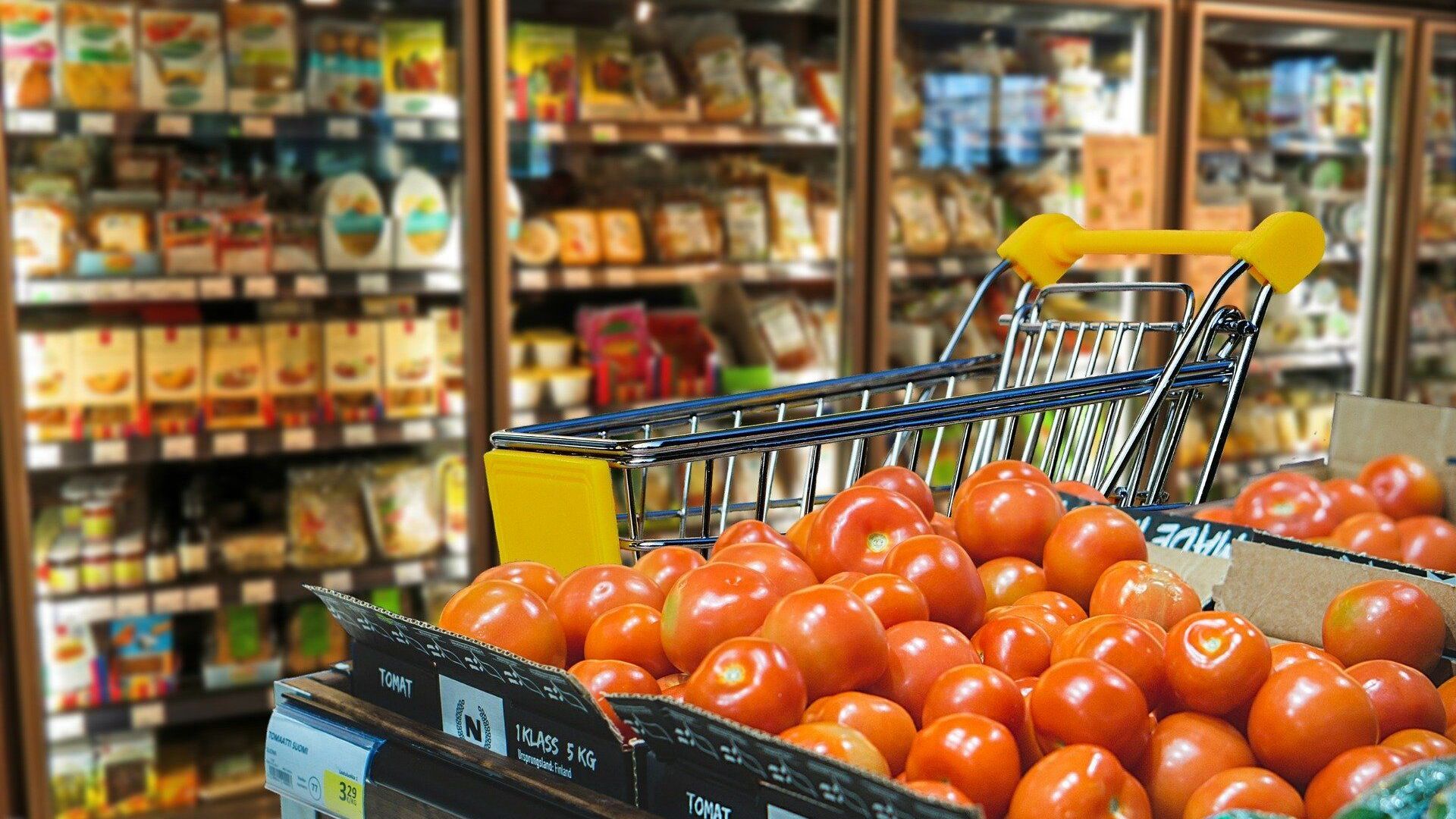https://sputnikglobe.com/20240310/brussels-creates-food-crisis-simulation-amid-farmers-protests-1117237082.html
Brussels Creates Food Crisis Simulation Amid Farmers’ Protests
Brussels Creates Food Crisis Simulation Amid Farmers’ Protests
Sputnik International
The COVID-19 pandemic, Western sanctions against Russia which backfired spectacularly, as well as shipping route disruptions due to geopolitical, and climate related issues have caused prices to skyrocket. Now, unpredictable and destructive climate change caused by humans is exacerbating the issue, prompting Europe to prepare for a full-scale food crisis.
2024-03-10T06:16+0000
2024-03-10T06:16+0000
2024-03-10T06:16+0000
world
food
europe
food crisis
european union (eu)
russia
poland
brussels
nord stream
economic restrictions
https://cdn1.img.sputnikglobe.com/img/107749/69/1077496981_0:12:1920:1092_1920x0_80_0_0_f2c315272a9fdb51a553009551637b5c.jpg
The COVID-19 pandemic, Western sanctions against Russia which backfired spectacularly, as well as shipping route disruptions due to geopolitical, and climate related issues have caused prices to skyrocket. Now, unpredictable and destructive climate change caused by humans is exacerbating the issue, prompting Europe to prepare for a full-scale food crisis.And so at the beginning of February, Project Partners Sciences Po, Prospero & Partners, Chatham House, European Policy Centre and INRA organized a food crisis simulation while distraught farmers protested across Brussel’s roads and streets.During the first part of the simulation, participants took up roles as "Task Force" members who were entrusted with the task of formulating policy recommendations for EU lawmakers, in order to address the food crisis, a recent report on the simulation said. Participants were split up into different groups: crisis response mechanisms, agriculture & food production, and trade & finance.In the same city where the workshop was being held, farmers in convoys of tractors were protesting by throwing firecrackers, eggs, and beer bottles at police while urging political leaders to provide relief from rising prices and other bureaucratic restrictions. And a few days prior to the food simulation crisis in Brussels, protestors and demonstrators spilled 160 tons of Ukrainian grain from rail cars at a station in Poland.Until now, Europe has been in an enviable position regarding their food security. Western countries are generally the best fed in the world, and are one of the world’s biggest suppliers of foodstuffs from grains and dairy to pork and olive oil. In 2021, the EU’s average household spending was 14% compared to some 60% in Nigeria and 40% in Egypt.But weather and climate events are hitting farmers regularly and cost the EU more than €50 billion ($54.3 billion) in economic losses in 2022 as a result of the soaring cost of fertilizers and energy needed to grow crops. In addition, political decisions made by European bureaucrats contribute to rising food prices. Denmark and Sweden refused to continue investigation into the Nord Stream sabotage reportedly committed by the US which cause a sharp upsurge in energy prices in Europe, subsequently contributing to rising costs for farming and transportation. Having been cut off from the cheap Russian energy and imposed sanctions on any company cooperating with the Russian business or state, European policy makers shot themselves in the leg. Now, chickens come home to roost as European farmers launch anti-government demonstrations almost on a daily basis demanding decisive actions to ease the situation, refusing to send more money to Ukraine when prices in Europe are constantly going up.The simulation predicted that this crisis will continue, and that in 2025 thieves will be seen looting supermarkets while police struggle to contain riots in the cities. Meanwhile, those living in Germany won’t be able to find fish and meat at their grocery stores.The simulation reportedly addressed solutions which included: building reserves, food provision for the most food insecure, and a cut on subsidies for livestock farmers as a way to veer away from the EU’s overreliance on crop imports like soy. A move that farmers, who are already fed-up with bureaucratic choices like these, probably wouldn't appreciate. A unanimous decision that diets should be pushed away from meat and towards vegetarian options was also introduced.But a two-day workshop, where participants were reportedly served food and refreshments, will not be enough to address this long-term issue.At the end of January the Food System Economics Commission (FSEC) reported that if the global food system were overhauled, trillions of dollars worth of benefits could be brought back into the global economy.
https://sputnikglobe.com/20240228/we-have-become-our-own-enemy-polish-farmers-remarkable-protest-against-europes-self-destruction-1117028033.html
https://sputnikglobe.com/20240115/afd-mp-explains-why-german-farmers-are-up-in-arms-against-scholz-government-1116183896.html
https://sputnikglobe.com/20240130/switching-to-sustainable-food-system-could-create-up-to-10-trillion-in-benefits-a-year-1116482247.html
russia
poland
brussels
Sputnik International
feedback@sputniknews.com
+74956456601
MIA „Rossiya Segodnya“
2024
News
en_EN
Sputnik International
feedback@sputniknews.com
+74956456601
MIA „Rossiya Segodnya“
Sputnik International
feedback@sputniknews.com
+74956456601
MIA „Rossiya Segodnya“
food crisis, food crisis, farmer protests, farmers protests, farmers' protests, farmers' unions, haystacks and piles of manure, farmers protests, farmers demonstrations, farmers in europe, farmers protest in europe, european farmers, energy crisis in europe, sanctions against russia, economic crisis, energy crisis, growing prices, nord stream sabotage, nord stream, sanctions failed, sanctions backfired
food crisis, food crisis, farmer protests, farmers protests, farmers' protests, farmers' unions, haystacks and piles of manure, farmers protests, farmers demonstrations, farmers in europe, farmers protest in europe, european farmers, energy crisis in europe, sanctions against russia, economic crisis, energy crisis, growing prices, nord stream sabotage, nord stream, sanctions failed, sanctions backfired
Brussels Creates Food Crisis Simulation Amid Farmers’ Protests
Over two days in central Brussels last month, about 60 European Union (EU) and government officials, food security experts, industry representatives and journalists met with each-other to confront the possibility of a food crisis.
The COVID-19 pandemic, Western sanctions against Russia which backfired spectacularly, as well as shipping route disruptions due to
geopolitical, and climate related issues have caused prices to skyrocket. Now, unpredictable and destructive climate change caused by humans is exacerbating the issue, prompting Europe to prepare for a full-scale food crisis.
And so at the beginning of
February, Project Partners Sciences Po, Prospero & Partners, Chatham House, European Policy Centre and INRA organized a food crisis simulation while distraught farmers protested across Brussel’s roads and streets.
During the first part of the simulation, participants took up roles as "Task Force" members who were entrusted with the task of formulating policy recommendations for EU lawmakers, in order to address the food crisis, a recent report on the simulation said. Participants were split up into different groups: crisis response mechanisms, agriculture & food production, and trade & finance.
In the same city where the workshop was being held, farmers in convoys of tractors were protesting by throwing firecrackers, eggs, and beer bottles at police while urging political leaders to provide relief from rising prices and other bureaucratic restrictions. And a few days prior to the food simulation crisis in Brussels, protestors and demonstrators spilled 160 tons of Ukrainian grain from rail cars at a station in Poland. 
28 February 2024, 03:13 GMT
Until now, Europe has been in an enviable position regarding their food security. Western countries are generally the best fed in the world, and are one of the world’s biggest suppliers of foodstuffs from grains and dairy to pork and olive oil. In 2021, the EU’s average household spending was 14% compared to some 60% in Nigeria and 40% in Egypt.
But weather and climate events are hitting farmers regularly and cost the EU more than €50 billion ($54.3 billion) in
economic losses in 2022 as a result of the soaring cost of fertilizers and energy needed to grow crops.
In addition, political decisions made by European bureaucrats contribute to rising food prices. Denmark and Sweden refused to continue investigation into the Nord Stream sabotage reportedly committed by the US which cause a sharp upsurge in energy prices in Europe, subsequently contributing to rising costs for farming and transportation. Having been cut off from the cheap Russian energy and imposed sanctions on any company cooperating with the Russian business or state, European policy makers shot themselves in the leg.
Now, chickens come home to roost as European farmers launch anti-government demonstrations almost on a daily basis demanding decisive actions to ease the situation,
refusing to send more money to Ukraine when prices in Europe are constantly going up.

15 January 2024, 19:38 GMT
The simulation predicted that this crisis will continue, and that in 2025 thieves will be seen looting supermarkets while police struggle to contain riots in the cities. Meanwhile, those living in Germany won’t be able to find fish and meat at their grocery stores.
The simulation reportedly addressed solutions which included: building reserves, food provision for the most food insecure, and a cut on subsidies for livestock farmers as a way to veer away from the EU’s overreliance on crop imports like soy. A move that farmers, who are already fed-up with bureaucratic choices like these, probably wouldn't appreciate. A unanimous decision that diets should be pushed away from meat and towards vegetarian options was also introduced.
But a two-day workshop, where participants were reportedly served food and refreshments, will not be enough to address this long-term issue. “We’ve been living in crisis for the last three years,” said Chris Hegadorn, a retired US diplomat who co-organized the workshop, and an adjunct professor of global food politics in Paris. “There's a lot more to be done on every level. Crises are only going to come faster and harder.”
At the end of January the Food System Economics Commission (FSEC) reported that if the global food system were overhauled, trillions of dollars worth of benefits could be brought back into the global economy.

30 January 2024, 05:10 GMT





